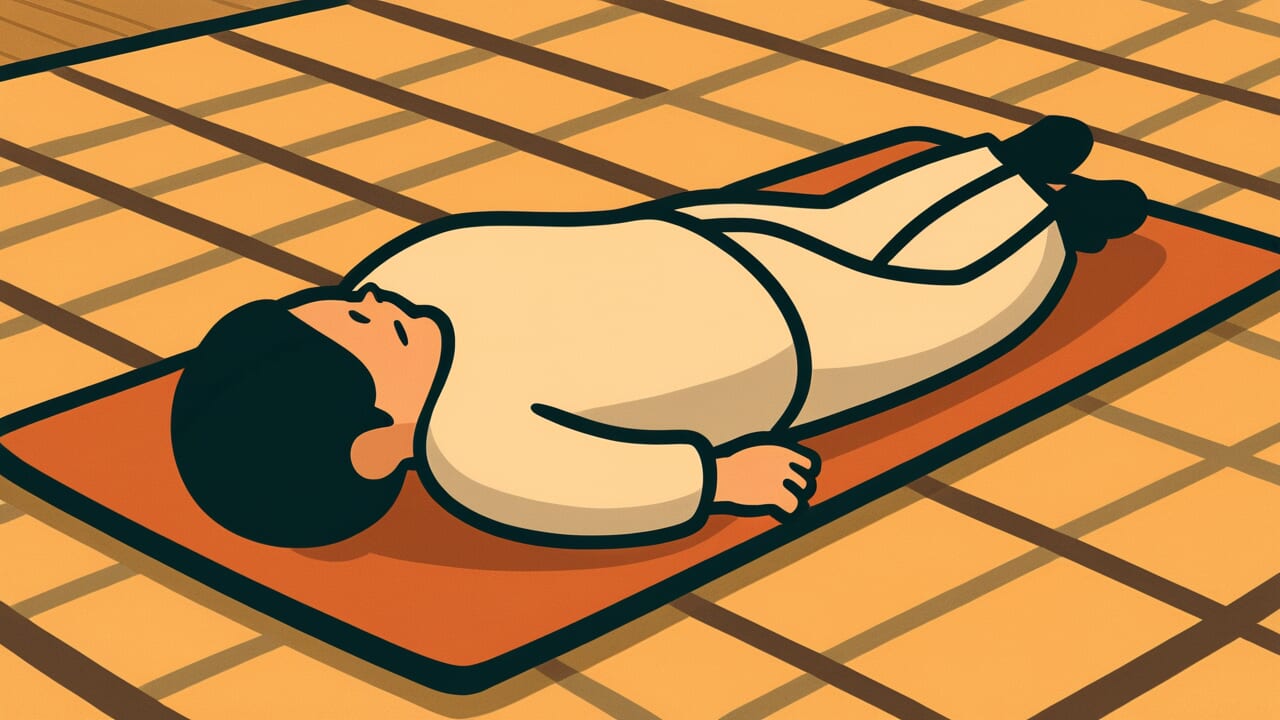How to Read “Even if you sleep in a thousand-mat room, you only need one mat”
Senjōjiki ni nete mo ichijō
Meaning of “Even if you sleep in a thousand-mat room, you only need one mat”
This proverb means that no matter how much space you have, you can only use a limited amount.
Even if you sleep in a room with a thousand mats, your body only takes up one mat’s worth of space. This isn’t just a physical fact. It contains deep insight about human desire and ownership.
People use this proverb to warn against seeking excessive wealth or luxury. Whether you live in a mansion or a simple house, the space you actually need and use is limited.
Today, we understand it as a warning about pursuing material wealth. Even if you seek more than you need, there’s a limit to what you can actually use.
This saying teaches us about the essential constraints of human existence.
Origin and Etymology
No clear written records explain the origin of this proverb. But we can make interesting observations from how the phrase is constructed.
“Senjōjiki” means a space large enough for a thousand tatami mats. During the Edo period, feudal lord mansions and castles actually had huge halls called “senjōjiki.”
Mountain regions also have flat plateaus named “senjōjiki.” Their vast size must have stirred people’s imagination.
“Ichijō” means one mat, the minimum space a person needs to lie down. In Japanese living culture, one tatami mat has always been the basic unit for one person to sleep.
This proverb probably emerged during or after the Edo period. Common people who saw the luxurious mansions of feudal lords and wealthy merchants made a practical observation.
No matter how large a mansion someone lives in, they only use one mat’s worth of space when sleeping. This universal fact about the human body combined with Japan’s unique tatami culture created this memorable proverb.
Interesting Facts
Places named “Senjōjiki” exist throughout Japan. The most famous is Senjōjiki Cirque in the Central Alps. This flat highland area is actually about the size of a thousand tatami mats.
The sense of calling such vast spaces “senjōjiki” forms the background of this proverb.
The minimum space humans need to sleep comfortably is actually about one tatami mat (approximately 1.65 square meters). This physical fact combines with Japanese living culture to give this proverb its persuasive power.
Usage Examples
- The boss wants a bigger office, but even if you sleep in a thousand-mat room, you only need one mat, so the current one is fine
- When I told my friend who dreams of building a huge mansion that even if you sleep in a thousand-mat room, you only need one mat, he fell silent and seemed to think deeply
Universal Wisdom
This proverb has been passed down because it sharply points out the fundamental gap between human desire and reality.
People always want more. A bigger house, more wealth, greater power. But no matter how much you gain, the human condition has unchanging constraints.
The amount you can eat at once, the space you need to sleep, the hours in a day. These don’t change based on how much wealth you have.
This truth hasn’t changed from ancient times to today. Roman emperors, Edo period feudal lords, and modern billionaires all need only one person’s worth of space to sleep.
This equality is the universal power of this proverb.
Our ancestors understood the essential limits of human nature. The difference between owning and using, between having and needing. When we confuse these, we become slaves to endless desire.
This proverb teaches the wisdom of contentment. The ability to distinguish between what you need and what you want. Knowing when you have enough.
This isn’t resignation. It’s the mature wisdom of accepting the truth of human existence.
When AI Hears This
In thermodynamics, the total amount of energy present and the amount you can actually use are completely different things.
A thousand-mat room contains enormous thermal energy. But the human body can only exchange heat with the one-mat floor area it touches. This is exactly the “constraint of availability” shown by the second law of thermodynamics.
What’s interesting is that this constraint isn’t just about physical contact area. The thermal energy in all the air in a thousand-mat room is massive.
But energy exchange between human body temperature at 36°C and room temperature at 20°C only happens at the limited boundary of the skin surface.
Due to the law of entropy increase, the “high-quality energy” you can use from this temperature difference rapidly disperses. It becomes “low-quality energy” you can’t use.
Furthermore, humans need temperature regulation to maintain order during sleep and recovery. Heat exchange through one mat’s contact surface is sufficient for this.
Having more space doesn’t improve thermodynamic efficiency. It’s like how a power plant has huge cooling towers, but only limited steam flow actually turns the turbines.
This proverb beautifully expresses the core of thermodynamics. What matters isn’t total energy but the free energy a system can actually use.
Lessons for Today
Modern society drives us to want “more, more.” A bigger house, more possessions, greater success. But this proverb gives us a chance to stop and think.
What do you really need? The things you actually use every day and truly enjoy might be fewer than you think.
Half the clothes in your closet go unworn. Many books on your shelf never get reread. Corners of large rooms become storage spaces. Sound familiar?
This proverb teaches us to value quality over quantity. Identify what you need and use it well. That’s where true richness lies.
You don’t need to become a minimalist. Just think about what truly has value for you. Focus not on size or quantity, but on how you use things and enjoy them.
When you shift your awareness there, your life becomes more fulfilling. Knowing when you have enough isn’t resignation. It’s the first step toward true freedom.



Comments